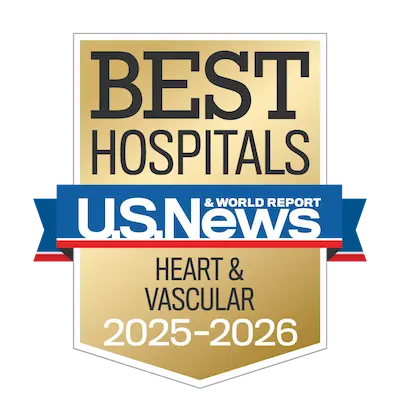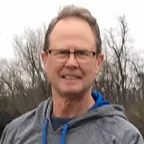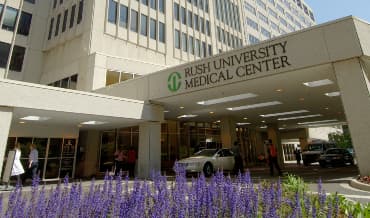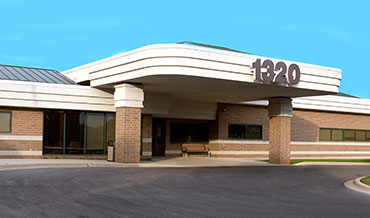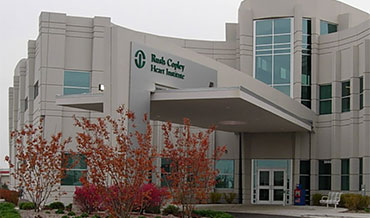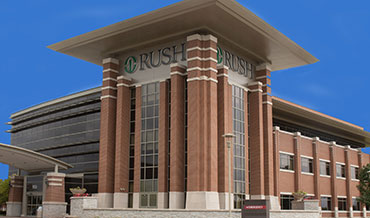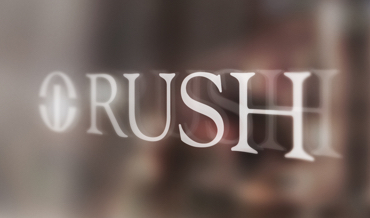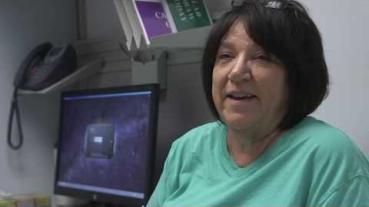If you have heart or vascular problems, you may need the help of a specialist called an interventional cardiologist.
Interventional cardiology is a type of care that involves minimally invasive procedures without the need for open heart surgery. These minimally invasive procedures often lead to faster recovery times and fewer complications than traditional open heart surgery.
Interventional cardiologists use catheters, or small tubes, that they insert through the arteries of the wrist or groin and run to areas of the heart and valves that need treatment. With these catheters, they can run tests and implant devices or stents that can fix heart and vascular issues.
A branch of interventional cardiology called structural cardiology focuses on fixing issues in heart valves. Structural cardiologists also use catheters to treat problems with heart valves.
The Rush Approach to Interventional Cardiology Services
Interventional cardiologists at Rush in Chicago and nearby communities are leaders and trusted authorities on the latest technology and research. That means you’ll have access to the newest treatments for narrowed blood vessels, structural heart disease and other heart and vascular issues.
We know how important it is to have an accurate diagnosis, as it allows us to further customize your treatment plan.
Before you see an interventional cardiologist, your heart and vascular care team will run many diagnostic tests. These can include stress tests, echocardiograms and CT scans of the heart or coronary arteries.
Your visit with the interventional cardiologist will happen in the cath lab, which is short for cardiac catheterization laboratory. The interventional cardiologist may confirm some of your test results by taking images of your arteries using a dye given to you through an IV.
Our team then uses the latest nonsurgical methods, which involve tiny incisions in the groin or wrist to treat heart and vascular problems. This means safer procedures and faster recovery than with traditional open heart surgery.
One of the most common conditions our interventional cardiologists treat is coronary artery disease. This happens when the coronary arteries that carry blood to the heart muscle become blocked or narrowed. Without treatment, this blockage can prevent the heart from getting the oxygen and nutrients it needs and cause a myocardial infarction, also known as a heart attack.
The interventional cardiologist will often treat coronary artery disease by using a catheter to place a stent. A stent is a small tube that expands in a coronary artery to keep it open and prevent blockages.
Another common procedure our interventional cardiologists perform is pericardiocentesis, which removes fluid that builds up in the pericardial sac that surrounds the heart.
Our structural cardiologists can repair mitral valve leakages with clips and devices, or they can install plugs to fix holes in the heart caused by congenital heart defects.
Interventional cardiologists at Rush also run diagnostic tests to find health issues and recommend treatments.
For example, they may perform a right heart catheterization, also called pulmonary artery catheterization. This is a procedure used to measure pressure in the heart and lungs. They may perform biopsies of the heart or arteries to help other heart and vascular specialists diagnose and treat heart failure.
Another test we offer is coronary function testing to investigate angina or chest pain when the coronary arteries are functioning normally.
Second Opinions on Interventional Cardiology at Rush
A second opinion on your diagnosis or treatment plan for heart and vascular issues can help you better understand your condition and make decisions about your care with more confidence.
Our team of interventional cardiologists is well trained in every aspect of care for your heart and valves. In our modern cath lab, they can diagnose and treat virtually any cardiovascular problem, whether it’s coronary artery disease, heart attacks, blockages of the heart or any other issue.
With its diagnostic tools and care options, your Rush heart and valve care team will provide an accurate diagnosis and work with you to form a custom treatment plan for your unique needs.
To get a second opinion, call Rush at (888) 352-7874. Our care coordinators will help you with scheduling any appointments you may need and answer your questions.
Rush Excellence in Interventional Cardiology Services
- Personalized treatment plans: If you have structural or valve-related conditions, our interventional cardiology experts personally evaluate you and design custom treatment plans — offering the newest nonsurgical valve replacement and hybrid surgical procedures.
- Minimally invasive procedures: We treat valvular heart disease through minimally invasive, catheter-based procedures, which means faster recovery, less rehab and less pain for you. One of these procedures is TAVR (transcatheter aortic valve replacement), which involves replacing the aortic valve without needing open heart surgery. We also offer MitraClip procedures for those with severe leakage in their mitral valve. Given the minimally invasive nature, these are ideal treatment options for those not eligible for traditional surgery.
- Advanced imaging and diagnosis: Our heart and vascular specialists are experts in diagnosing all heart and vascular conditions. You’ll have access to the full spectrum of tests and imaging tools for diagnosing your condition, including MRIs, CT scans and coronary function testing. This lets your team get a complete image of your heart and blood vessels to find any issues and offer individualized care plans.
- All the experts working together: Since many of these procedures take place in the interventional platform at Rush University Medical Center in Chicago and Rush Copley Medical Center in Aurora, Illinois, specialists from all heart and vascular specialties work together to give you the most accurate diagnosis and effective treatment.
- Nationally recognized care: U.S. News & World Report includes Rush University Medical Center on its Best Hospitals Honor Roll and ranks our cardiology, heart and vascular surgery programs among the best in the country. It also ranks Rush as High Performing in TAVR procedures, heart failure care and heart attack care.
FAQs About Interventional Cardiology
Both interventional cardiology and cardiothoracic surgery deal with treating the heart and valves. But the ways they treat and diagnose cardiovascular issues differ.
Cardiothoracic surgery mostly involves open heart surgery to visualize the heart and arteries, then bypass any blockages or fix valves.
Interventional cardiology treats and diagnoses the same issues with minimally invasive approaches that generally do not involve traditional surgery. It relies on catheters generally inserted through small incisions in the radial artery from the wrist or from the groin.
At Rush, our interventional cardiologists and cardiothoracic surgeons work together to provide each patient with the safest and most effective options for treatment.
Any patient who needs heart and valve treatment and is at high risk for complications from open heart surgery may benefit from a minimally invasive treatment option. This includes patients who have had an acute heart attack.
To determine your risk level and your available treatment options, your heart and vascular care team will discuss your case with experts across many specialties, including surgeons. They will work with you to form a custom care plan that addresses your needs.
Rush has robust clinical trials in interventional cardiology and structural heart disease care. This allows us to offer new treatment options, including stents, balloons, heart pump support and mechanical circulatory support for patients who need high-risk interventions in the heart and arteries. We can provide new technology and new valves for patients with aortic stenosis and mitral regurgitation.
Your heart and vascular team will discuss these options with you if they find that you are a good candidate for these innovative treatments that may not be available at other medical centers.
The main benefit of minimally invasive cardiology treatments over traditional surgery is your comfort. That comes in the form of faster recovery times and fewer risks for complications. For example, patients who have minimally invasive stent placement can often go home the same or next day.
During your consultation, your team will review all your test results that they need to form your care plan, including echocardiograms and CT scans. They will talk to you and your family to form a detailed medical history, then perform a physical examination. A surgeon will also be available for the consultation if the team feels that open heart surgery may be an option. By the end of the consultation, the team will have your care plan ready and present you with the best options available for treatment. They will also go over what to expect after any procedures in terms of your quality of life and future care you may need.


